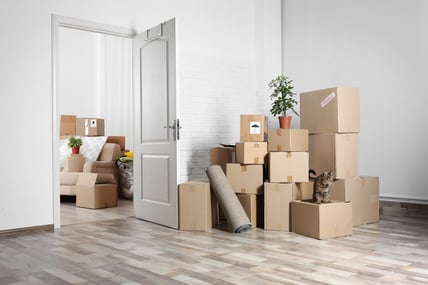If you’re moving overseas, you already have a ton on your mind—packing up your household, arranging transportation, maybe nailing down details about a job, or where you’ll live—and on and on.
So you’ll be glad to know there’s at least one thing you won’t have to do when you move: pay duties on your personal effects. At least, not if you follow the rules and present all the necessary documents.

Most countries are fairly generous about household goods you can bring across the border without paying duties. Furniture, clothing, kitchenware, electronics, even motor vehicles—most items you’ve used in daily life and will continue to use can enter without charge. Load any number of ocean containers and send them overseas, all at once or within a 12-month period. As long as Customs agents agree that these are used personal effects, you won’t pay duties.
There are a couple of catches, though:
The country you’re leaving must have been your residence for at least 12 consecutive months
Say you’re a Polish citizen in the US with plans to return to Poland. If you’ve been in the US for less than 12 months, when you go through Polish Customs, you’ll pay duty on any personal possessions you bought in the States. You’ll also pay value added tax (VAT) on those items. But if you’ve been in the US for at least 12 months, you won’t pay duty or VAT on those goods, assuming they meet one more condition:
Only items you’ve owned for at least six months can enter duty free
Customs agents won’t scrutinize each product to figure out its age. But a major item that looks new, or that you pack in its original box, will probably catch an agent’s eye. To avoid a duty payment, be ready to prove that you bought it more than six months ago.
Also, be careful about quantities when shipping personal items overseas. Sure, it’s been eight months since you bought those two cases of your favorite household cleanser at Costco. It’s a great product, and you want plenty on hand to keep your new home clean. To Customs, though, it looks like you’re bringing in supplies for a janitorial business—a commercial import. Officials might let a couple of bottles slide, but you’ll pay duty on the rest.
What if you ship your car?
Some countries won’t let you import vehicles that are beyond a certain age, or whose engines exceed a certain size. But once you establish that you’re allowed to bring your vehicle, most of the same rules for duty-free entry when shipping household goods overseas will apply. Cars, pickup trucks, motorboats, motorcycles, all-terrain vehicles—they all enter without charge if they meet the qualifications. And you can ship as many as you like.
But there’s one extra rule for motor vehicles. It’s not enough to prove you owned the car or boat for at least six months. You must also prove you’ve had it registered in your name throughout that time.
The question of ownership and registration can be tricky. If you leased the car before you bought it, for example, or if a relative gave you the car as a gift, it might not be clear when you became the legal owner. If there’s even the slightest doubt, check with your freight forwarder, or with Customs in your destination country, to see if your vehicle is really exempt from duty and VAT. If it’s not, depending on circumstances, you might be better off selling the car before you move.
What documents do you need when shipping household goods overseas?
To avoid paying duties on qualified household goods, you’ll need the following:
- At least a year’s worth of rent receipts, bills for gas or electric service, landline telephone bills, or other official paperwork that proves you’ve lived in the country you are leaving for at least 12 months, without a break.
- A sales receipt for any item that appears to be new. This is to prove you’ve owned the item for at least six months.
- For any motor vehicle, the title and registration, to prove that you have owned the vehicle for at least six months and kept it registered during that time.
- Three lists of everything you’re shipping in your freight container:
- A written inventory, with estimated values and weights, to give to the Customs agent. This should be in the language of the country you’re shipping to.
- A copy of that list in the language of the country you’re leaving. Your freight forwarder needs this to prepare a Bill of Lading and other documents.
- A list for yourself. When you pack your personal effects, put a label on each box, tote or bag with a number and a name for the contents (e.g. “Dishes” or “Kids’ toys”). Then make a list of those labels. If a Customs agent asks to inspect any particular item, the list will help you find it quickly.
The dollars are in the details
You know that a good tax accountant can save you money by pointing out deductions you didn’t know were available. A freight forwarder with strong experience in shipping household goods overseas plays a similar role, expertly guiding you through the intricacies of import regulations, so every dollar you’re entitled to stays in your pocket.
Are you preparing to move your household to another continent? Contact the international moving specialists at I.C.E. Transport.





